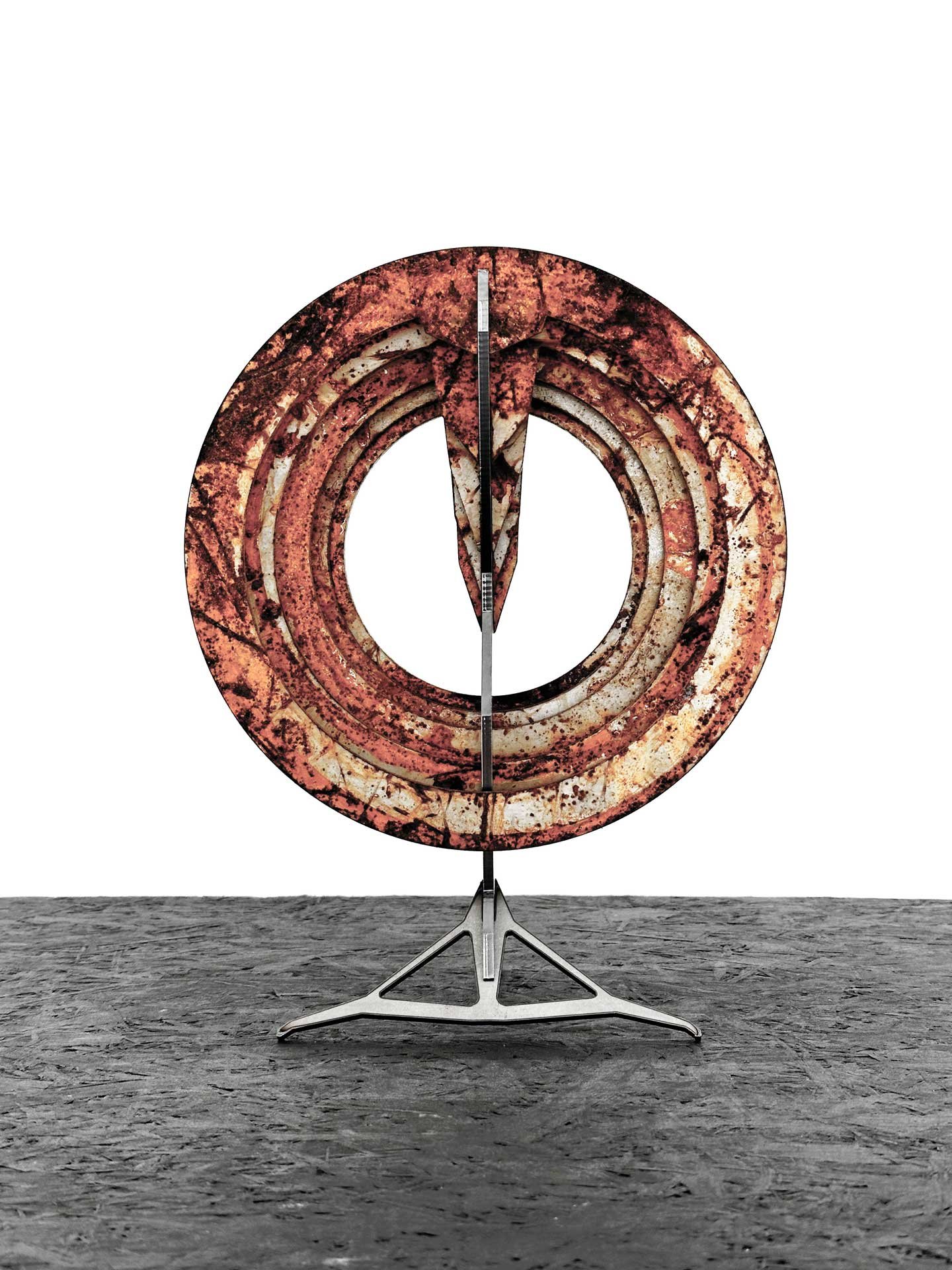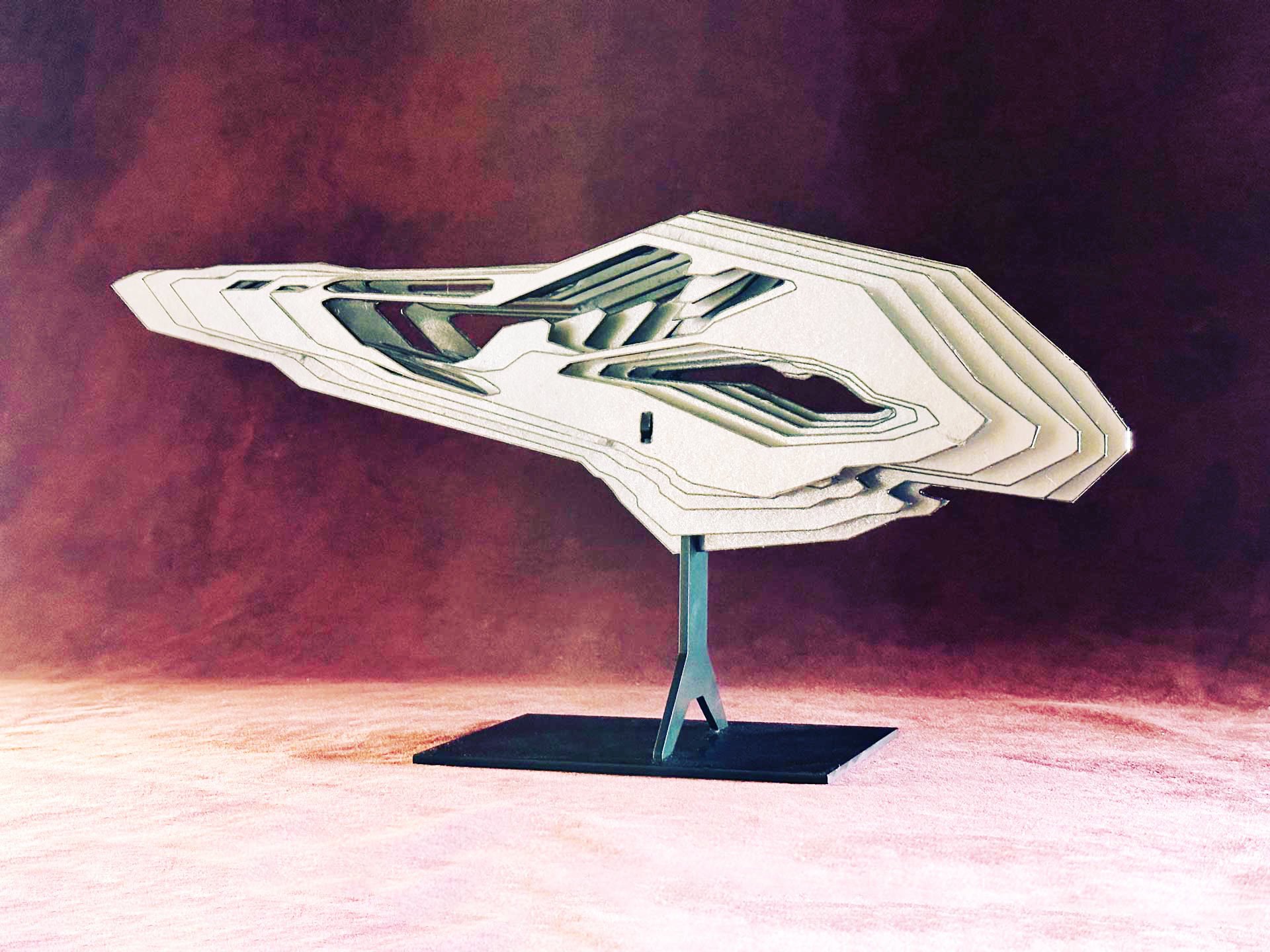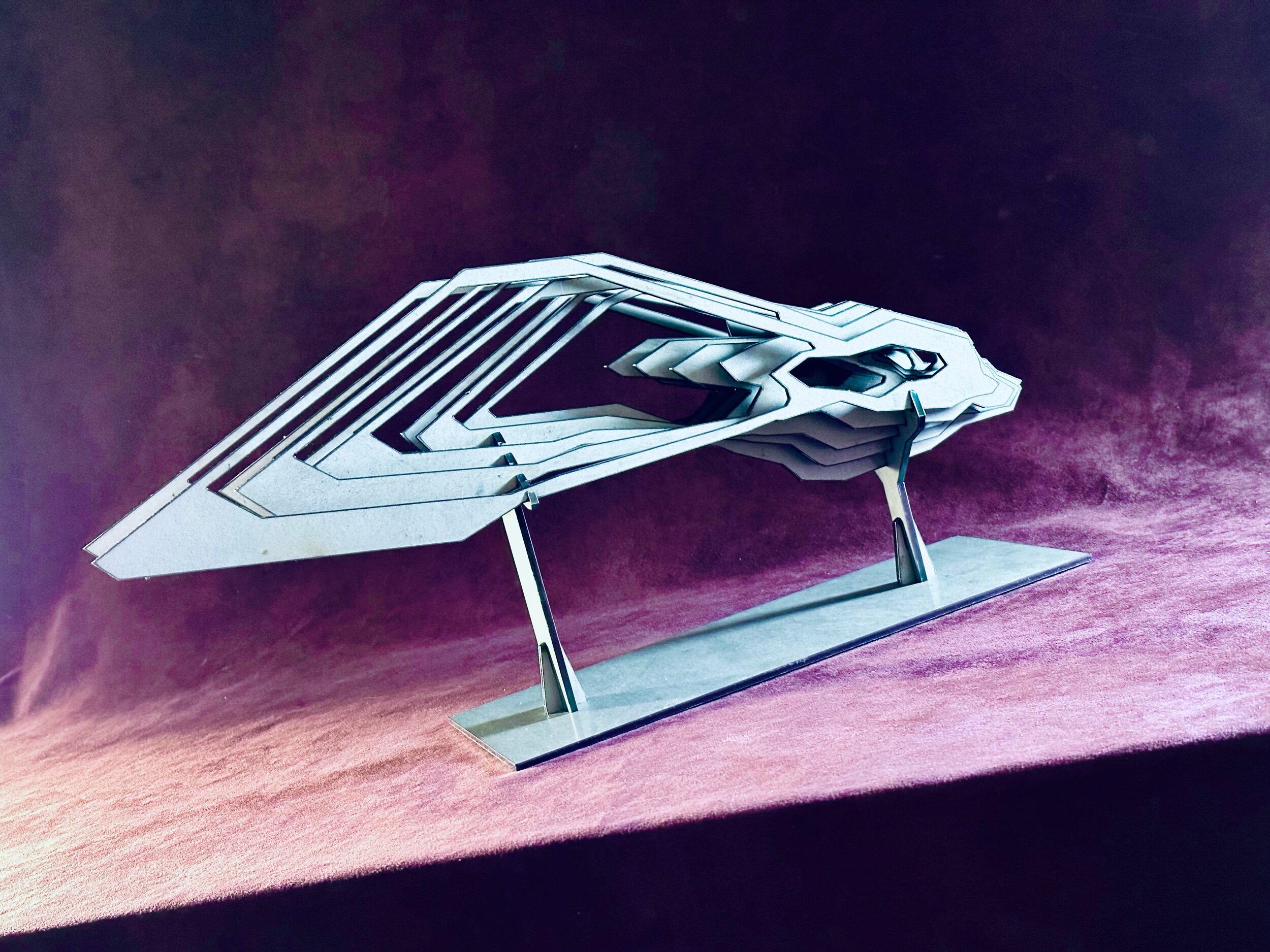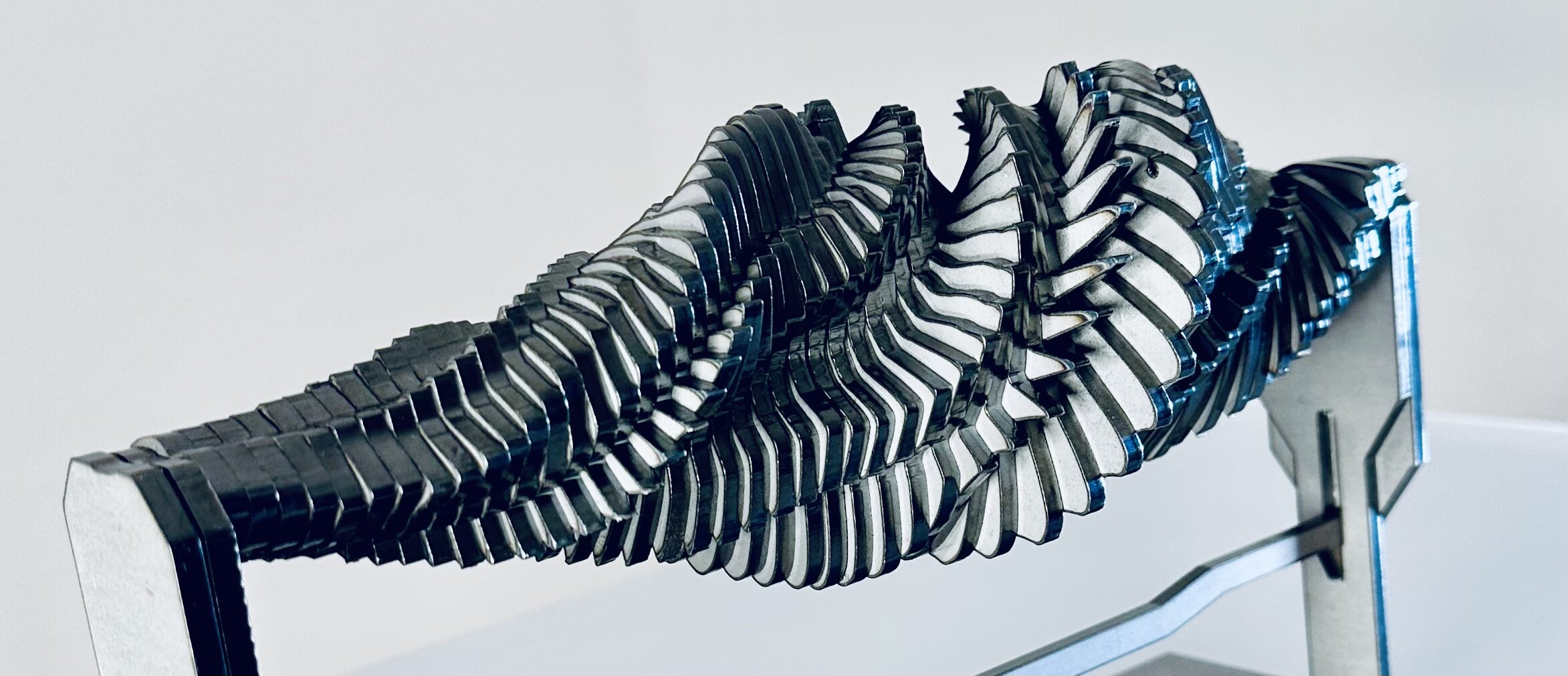Sculpting the Cosmos: How the ´Cosmic Rose` Rosette Nebula Inspired My Sculptures
The Rosette Nebula is one of the most captivating wonders of the cosmos. This is a story about how it inspired me to create my layered steel sculptures.
7. April, 2025 - Blog #215 - Reading time 11 Min. - Peter von Hauerland
#rosettenebula #universe #cosmos #sciart #spaceart #sheetsteel #sheetmetal #sculptures #inspiredbycosmos
Read Full Art Blog Article For Free Here
A vast cosmic bloom floating 5,000 light-years away in the constellation Monoceros, its deep, layered beauty is both mesmerizing and enigmatic. It is a nebula that defies simple interpretation—it is not just a cloud of gas, nor just a birthplace of stars. It is a complex, multilayered phenomenon, shifting between chaos and harmony. This interplay of structure, depth, and energy is precisely what inspired me to translate its essence into sculpture.
The Depth and Mystery of the Rosette Nebula
What makes the Rosette Nebula so captivating is its immense scale and intricate composition. Spanning about 130 light-years across, it is a stellar nursery where new stars ignite from collapsing clouds of hydrogen and dust. But what fascinates me most is the visual paradox: despite its turbulent formation processes, it appears delicate and soft, its gaseous filaments resembling petals of a cosmic rose. At the same time, it carries an overwhelming sense of depth. The deeper you look, the more there is to discover—subtle structures, varying densities of matter, and an ethereal cavity at its center where young, massive stars have carved out a void through intense radiation.
This concept of depth—not just in terms of distance, but in meaning and complexity—is what I wanted to capture in my sculpture, Rosette Nebula.
Translating Cosmic Beauty into Sculpture
My sculpture, Rosette Nebula, is one of the tallest pieces I’ve created, at least by my usual standards. It expresses the nebula’s grandeur and vastness, but not through literal imitation. I am not interested in direct representations; rather, I seek to extract the essence of celestial structures and materialize them into contemporary sculpture.
The layering principle that defines this piece serves multiple purposes. Visually, it mimics the stratified composition of the nebula itself, where dense clouds and ionized gases create shifting, textured formations. Technically, it relates to my ongoing exploration of modern sculpture as an intersection of aesthetics, technology, and human curiosity. My sculptures are constructed from precisely cut layers of steel, forming a structured yet fluid composition—an approach inspired by both scientific imaging techniques and the natural world.
The Illusion of Hovering in Space
One of the defining characteristics of Rosette Nebula is its illusion of floating. The sculpture becomes thinner towards the bottom, creating the impression that it is levitating when placed on a pedestal or a table. This visual effect is intentional. The Rosette Nebula itself is suspended in the void of space, untethered, without a defined base or structure. By designing my sculpture to seemingly defy gravity, I reinforce the idea of an object existing outside traditional physical constraints, just like the nebula it is inspired by.
The most striking feature, however, is the central cavity that runs through the entire sculpture. This element is a direct homage to the real Rosette Nebula, where a cluster of young stars has hollowed out its core. Just as the nebula’s void is not an absence but rather a result of immense energy shaping its structure, the hollowed space within my sculpture is an integral part of its form. It is a balance between presence and emptiness, matter and void.
A Scientific Approach to Art
Beyond aesthetics, my sculptures are deeply influenced by the methodologies of science. I often compare my layering technique to the way telescopes like the James Webb Space Telescope analyze the cosmos. When JWST captures an image of a nebula, it does not simply take a single photograph—it scans the object in multiple wavelengths, isolating different elements such as hydrogen, oxygen, and dust. This layered approach to understanding the universe mirrors my artistic process: I build sculptures in layers, as if each sheet of steel were a separate spectrum of information, revealing more about the subject with every addition.
The concept of layering in my work also has connections to medical imaging. Just as CT scans slice through the human body to reveal internal structures, my sculptures present a kind of sectional analysis of cosmic forms. They are a synthesis of technology and artistic interpretation, grounded in a fascination for scientific exploration.
Contemporary Sculpture as a Fusion of Art and Discovery
For me, contemporary sculpture is not just about form—it is about merging aesthetics with technology, material with meaning, and artistic vision with scientific curiosity. Rosette Nebula is an example of this philosophy. It is not a literal depiction of a celestial object but an abstracted expression of its essence, capturing the interplay of depth, movement, and structure found in the nebula itself.
This sculpture is also a reflection of something greater—the innate human desire to understand and connect with the cosmos. Space is not just an external expanse; it is a conceptual and philosophical space where we project our questions, dreams, and discoveries. Through my work, I aim to bring a piece of that vast unknown into tangible form, offering a perspective that blends scientific wonder with artistic interpretation.
The Rosette Nebula as an Endless Source of Inspiration
Every time I revisit images of the Rosette Nebula, I find new details, new structures hidden within its gaseous formations. Its complexity is infinite, just like the creative process itself. There is something profoundly humbling about looking at an object so distant, so unreachable, yet knowing that it played a role in the formation of stars, planets, and even the very elements that make up our own existence.
In Rosette Nebula, I sought to capture that feeling—the sensation of looking into something vast and unknowable, yet deeply connected to us. It is a piece that embodies depth, both literally and metaphorically. It invites viewers to experience the layers of space, of material, and of artistic interpretation, all coming together to form a singular sculptural object.
The sculpture itself stands at 70 centimeters in height, with a compact but impactful 20 by 20-centimeter footprint. Made from Starborn Steel S235, it carries a weight of 6.5 kilograms, giving it a tangible presence that contrasts with its seemingly weightless form. The fine layers of steel, cut with precision, stack together to create a structure that feels both solid and ethereal, much like the nebula it represents. When light interacts with its surfaces, shifting shadows emphasize its depth and intricacy, reinforcing the illusion of cosmic motion. This is not just a static object—it is a sculpture that transforms with its surroundings, engaging with the space around it, much like the celestial body that inspired it.
Creating this piece was not just an artistic challenge; it was an exploration of how we perceive and represent the universe. The cosmos is not merely a backdrop to human existence—it is an active, evolving force that shapes us, inspires us, and fuels our creative pursuits. My sculpture is just one way of engaging with that reality, a tangible manifestation of cosmic beauty turned into contemporary art.
Through Rosette Nebula, I hope to convey not just the visual splendor of its celestial counterpart, but also the sense of endless discovery it represents. Just like the nebula itself, this sculpture is meant to be observed, interpreted, and explored, layer by layer, unveiling new perspectives with every glance.
Peter von Hauerland
Explore my science fiction-inspired sculptures and creations here:
Sculptures inspired by science fiction and paleontology:
WEEK 15/2025 ARTICLES:
Should You Ditch Twitter for Bluesky? Here is What You Need to Know
Why You Should Ditch Twitter for Bluesky – A Story of Power, Control, and Rebellion Against Oligarch.
Sculpting the Universe: Science Fiction-Inspired Sculptures in Spaceship-Themed Art Installation
There are moments in an artist’s life when everything aligns—vision, sound, light, and space—to create not just an exhibition, but an experience.
Why I Left Etsy and Built My Own Online E-commerce Art Shop
…and Why You Might Want to Do the Same
How Would Pottery Look if We Would Live in Space?
Read about my hilarious experience with showing my art on Reddit.
WEEK 14/2025 ARTICLES:
Is Now the Right Time to Become an Independent Creator?
This article explores the shifting landscape for artists, solopreneurs, and creatives considering financial independence.
Discover Bold New Visions at GROUP SHOW #8 in Berlin
Berlin’s contemporary art scene is set for an exciting new exhibition this spring.
How a Niche Art Website Skyrocketed: The 9-Month Story of Von Hauerland
Building an art-driven website isn’t easy, but after 9 months of hard work, Von Hauerland is taking off.
Artists against Fascism: Why Oligarchs Fear Creativity and Free Expression
Why is creativity under siege and why oligarchy feels threatened by the liberal arts.
WEEK 11/2025 ARTICLES:
Art Blog #206: Abstract and Figurative Sculpture Trends in Contemporary Art
Navigating the landscape of modern three-dimensional art can be complex, particularly when distinguishing between modern, contemporary, and ultra-contemporary sculpture.
Art Blog #205: How I Create Sculptures Inspired by Potential Life on Exoplanets
My sculptures are not just inspired by space exploration, technology, and paleontology. They are deeply influenced by the possibility of life existing beyond Earth—on faraway exoplanets.
Art Blog #204: From Division to Uncertainty: The Global Impact of America’s 2024 Political Shift
The 2024 U.S. presidential election marked a pivotal shift in American democracy, shaping domestic policies, global relations, and civil liberties.
Art Blog #203: Why I Use Both ChatGPT and Google Gemini
When I first dipped my toes into AI tools, I was cautious—maybe even a little skeptical. The first results felt a bit off, like a machine trying too hard to sound human.
WEEK 10/2025 ARTICLES:
Art Blog #202: From Quarks to Galactic Fossils: My Tech-Driven Obsession with Space
I've always been hooked on technology. Not just as a tool, but as an evolving force that fuels human curiosity—especially when it comes to space exploration.
Art Blog #201: The Wild Ride of Steel Prices (2021–2025): 5 Tops, 5 Flops, and What Comes Next
Steel isn’t just metal—it’s power, politics, and profit. Since 2021, the global steel market has been on a rollercoaster, driven by war, supply chain chaos, and geopolitical ego trips.
Art Blog #200: The Most Lit Meme Tees on the Web: Why You Need One Right Now
Enter Von Hauerland’s meme tee shirts, the ultimate way to slap your opinions, inside jokes, and sarcastic one-liners onto your chest.
Art Blog #199: Sculptures That Imagine Extinct Life Beyond Earth
Explore Galactic Fossils, a series of steel sculptures by Peter von Hauerland that reimagine the remains of extinct life forms discovered in the universe.
WEEK 9/2025 ARTICLES:
Art Blog #198: Galactic Fossils: Paleontology Inspired Metal Sculptures Born from Dying Stars
Metal is more than just a material. It is the final breath of a dying star - a cosmic relic forged in the heart of the universe.
Art Blog #197: I Need Space: Escaping the Noise to Protect What Matters
In a world flooded with breaking news alerts, algorithm-driven outrage, and a never-ending cycle of crisis after crisis, it's getting hard to catch a breath.
Art Blog #196: Ghost in the Shell: Anime Icon vs. Hollywood Reboot – A Cyberpunk Showdown
Ghost in the Shell. The name itself conjures images of rain-slicked neon streets, cyborgs with existential crises, and a haunting soundtrack that burrows into your soul.
Art Blog #195: Why You Should Write Down Your Dreams
I've always been fascinated by dreams. As a kid, I had this recurring dream about flying. It wasn't just a quick hop – I'm talking sustained, soaring flight.
LATEST IN OUR ART SHOP:
LIST OF BLOG ARTICLES:
Blog #214: Should You Ditch Twitter for Bluesky? Here is What You Need to Know
Blog #211: How Would Pottery Look if We Would Live in Space?
Blog #210: Is Now the Right Time to Become an Independent Creator?
Blog #209: Discover Bold New Visions at GROUP SHOW #8 in Berlin
Blog #208: How a Niche Art Website Skyrocketed: The 9-Month Story of Von Hauerland
Blog #207: Artists against Fascism: Why Oligarchs Fear Creativity and Free Expression
Blog #206: Abstract and Figurative Sculpture Trends in Contemporary Art
Blog #205: How I Create Sculptures Inspired by Potential Life on Exoplanets
Blog #204: From Division to Uncertainty: The Global Impact of America’s 2024 Political Shift
Blog #203: Why I Use Both ChatGPT and Google Gemini
Blog #202: From Quarks to Galactic Fossils: My Tech-Driven Obsession with Space
Blog #201: The Wild Ride of Steel Prices (2021–2025): 5 Tops, 5 Flops, and What Comes Next
Blog #200: The Most Lit Meme Tees on the Web: Why You Need One Right Now
Blog #199: Sculptures That Imagine Extinct Life Beyond Earth
Blog #198: Galactic Fossils: Paleontology Inspired Metal Sculptures Born from Dying Stars
Blog #197: I Need Space: Escaping the Noise to Protect What Matters
Blog #196: Anime Icon vs. Hollywood Reboot – A Cyberpunk Showdown
Blog #195: Why You Should Write Down Your Dreams
Blog #194: How I Design My Sheet Metal Sculptures: A Fusion of Space, Steel, and the Unknown
Blog #193: Best Art Quotes by Famous Artists: Wear Inspiration Like a Badge of Honor
Blog #192: How Science Fiction Movies Shape Modern Art and Sculpture
Blog #191: Cybertruck Graffiti - Vandalism or Genius Marketing?
Blog #190: You Think It, I Ink It: The Evolution of Tattoo Art as a Form of Personal Storytelling
Blog #189: How To Save On Art and Sculptures In 2025
Blog #187: Asteroid 2024 YR4: Is Earth Going to Face its Deep Impact Moment?
Blog #186: Sala Giochi: The Beating Heart of Italy’s Playful Past and Present
Blog #185: How Do I Create my Cosmos Inspired Sheet Steel Sculptures
Blog #184: Who is Katie Bouman? The Person Who Stands Behind the First Black Hole Picture
Blog #183: Conquer Your Mornings Like Van Gogh - One Shirt at a Time
Blog #182: Where is Jim Parsons Taking Us in the Next Season of Young Sheldon?



































